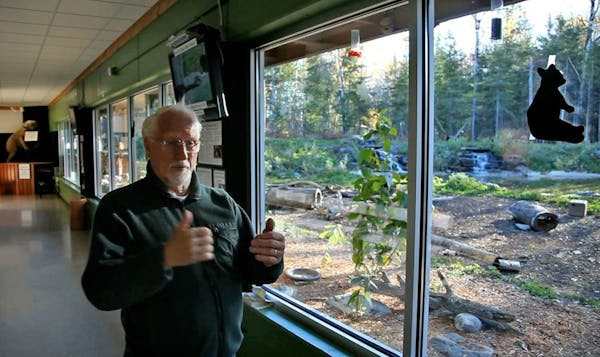He hand-fed wild black bears to get up close in his research, collaring his subjects for satellite tracking. He posted live Internet video feeds from their dens, attracting more than 140,000 Facebook followers who got to know bears such as Lily and Hope on a first-name basis.
But renowned bear researcher Lynn Rogers says that's all over now because the state Department of Natural Resources pulled his permit on Friday after 14 years.
"I'm devastated," said Rogers, 74, from his North American Bear Center near Ely, Minn. "It's the end of my 46 years of black bear research."
Tension between Rogers and the DNR has been rising for years, with heated written volleys. Commissioner Tom Landwehr, in a letter dated Friday, accused Rogers "of extremely unprofessional behavior with research bears."
DNR Wildlife Research Manager Lou Cornicelli said Rogers' methods of cozying up to the bears, including hand-feeding, has created a public safety threat with 50 so-called habituated bears increasingly dependent on human contact roaming the woods near Rogers' sprawling center outside Ely.
"Bears are breaking into cabins, sticking their heads in cars and behaving in ways wild bears would not otherwise do," Cornicelli said. "The public safety issues have become intolerable from our perspective."
Rogers called that "a crock" and said DNR officials are jealous of his fame and grew angry when his followers swamped the commissioner's office with letters pleading for protection for his collared bears.
The bear center, an expansion of which is currently under construction, will remain open. But the DNR has given him until the end of July to remove all bear collars and the commissioner told him "your activities may no longer involve radio-collaring wild bears or disturbing, handling or videotaping wild bears in dens."
Cornicelli insisted jealousy and anger were not factors in the DNR's decision, but a lack of peer-review research publications played a role in the decision to yank the permit. The DNR has been asking Rogers to produce published reports for years. Rogers points to dozens of documentaries and his use of GPS and Internet technology.
"Right now, I'm doing the best scientific research I've ever done," he said. "With the additional technology, we can study stuff we could never study before. Now we cannot freshen that information."
Rogers said when Hope, a young bear made famous online, was shot and killed by a hunter in 2011, a few online comments criticized hunters. He had those comments removed, but said the DNR is lashing out for that rancor against hunters.
"That had nothing to do with it," Cornicelli said. "This is not a social media exercise. We are a science-based agency protecting the best interests of the species we manage and the public safety we're obligated to protect."
Rogers said he'll reluctantly adhere to Friday's decision because "legal action against the DNR would be futile." His North American Bear Center, a $1 million facility that opened in 2007 and attracted 30,000 annual visitors by 2010, is struggling with cost overruns involving a new addition and filing a lawsuit would cost "money we just don't have."
Since den-cam videos made Rogers a global wildlife celebrity, with British Broadcasting Co. crews and other documentary filmmakers covering him tracking bears, donations have poured in. One individual kicked in $400,000 and fans forked out another $200,000 to support his work.
Rogers retired as a U.S. Forest Service bear and deer researcher in 1993 and insists his popularity as an independent researcher rankles DNR officials.
"There's a long history of animosity," said Rogers, who said a DNR official gasped at a conference once when two of his articles were ranked highly in a survey of international bear researchers.
"I'm not going to dispute that Dr. Rogers was a well-published bear researcher," Cornicelli said. "But that research has ceased. The primary reason to extend a research permit is for research and we've been asking for six years to show us measurable outcomes and it hasn't happened."
The DNR will allow Rogers to continue educational programming through captive bears under an agency-approved game farm permit.
"That's nothing," Rogers said. "Our documentaries have been seen by more than 100 million people, advertising the beauty of Minnesota that led thousands to come to the state. This decision is not about the public interest."
The DNR insists that's precisely what it's about.
"Bears are unpredictable and can be dangerous," Cornicelli said. "By his count, there are 50 bears wandering the landscape so used to human contact, and that will be a long-term issue for us."
Curt Brown • 612-673-4767
Minneapolis City Council declines to endorse Frey's Third Precinct plan
Minneapolis will bid to host Sundance Film Festival

Clash brewing over proposed Lino Lakes development that includes mosque
In heated western Minn. GOP congressional primary, outsiders challenging incumbent

